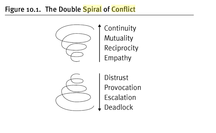 One of my favorite podcasts is Rainer on Leadership. Their episode today on "Six of the Most Common Reasons for Church Staff Conflict" is incredibly timely for anyone serving alongside other people. Inevitably, whenever you're on a team, there's going to be conflict. Differences of opinion becomes divergent visions. The quirks that were once appealing in the early stages become incredibly frustrating. And the adjustment to a new setting becomes a realization of a lazy work ethic. At the root of most conflict on a team is a lack of chemistry. It's hard to define and describe what chemistry is, and even when I tried writing a book chapter on chemistry the best I could come up with was Friendship, Unity, and Trust. Even that I don't feel like totally captures the essence of chemistry. But we can see it when it's not there. We can see when the players on the bench are disengaged from the game because they don't care. We can see the rolling eyes during a meeting. We can see when times are tough that everyone turns to self-preservation and throws others under a bus.  Ultimately I think most of our conflict comes down to a breakdown in chemistry. We fail to fall back on the Friendships, the Unity, and the Trust that make a great team. Instead we see others as rivals, we're driven by jealousy; or we break into factions; or we build intricate webs of conspiracy and questioning. And because most of us are conflict aversive, we see things spiral out of control until the only way to resolve the conflict is to break the relationship (or in this case see turnover on a staff). So how can we work towards a healthy team with healthy discussion with healthy resolution? 1. Friendships - Remember that no matter what, relationships > being right. If it costs you a team member or an ally or a friend to prove a point, you lost. Any team, especially one that's in ministry, is driven by the strengths of its relationships. And that means you put the relationship first, you put the reconciliation of a relationship first. If not, you're setting yourself up for an implosion. Friendships on a team don't mean that you're always hanging out on the weekends. But it does mean that you enjoy working together. 2. Unity - One of the biggest frustrations and causes of conflict on a church staff is a lack of direction. No one can articulate what the vision is, what the roadmap is. There's a competition for resources, facilities, time, and money. There's no coordination in scheduling. There's no clear process for how things work on a weekly or monthly basis. But beyond systemic or structural unity, there's no personal unity. One of the biggest lessons I've learned as a lead pastor is that I have the unique ability to advocate for my team. If those serving with you should know anything about you, it's that you've got their back. One pastor I served with told me "I'm in your corner, I'll go to bat for you. Unless you steal, commit adultery, or teach heresy." 3. Trust - Trust is so important because trust has the ability to absorb risk. Risk is when we feel like we need to step out in a bold move, make hard decisions, or put in vision. With any kind of risk we have to come back to the team around us and the trust they've put in us. Conflict happens when risk is taken without sufficient trust (reckless leadership), or when sufficient trust is there and risk isn't taken (maintaining the status quo). Conflict can be mitigated on a team when there's a piggy bank of trust built up. And that takes intentional time to get there. It's not automatic, you have to spend time working to build trust so you can absorb risk. How do you and your team help work through conflict with chemistry? Side Note - One of the best resources on church staff conflict is a little booklet by Speed Leas.
0 Comments
Leave a Reply. |
Scott M. DouglasA blog about leadership and the lasting legacy of family ministry. Archives
August 2023
Categories
All
|
 RSS Feed
RSS Feed



